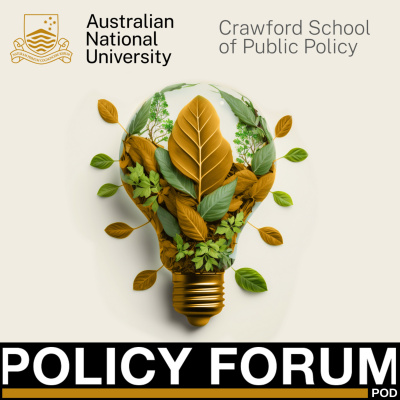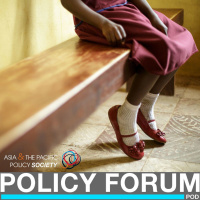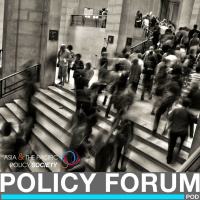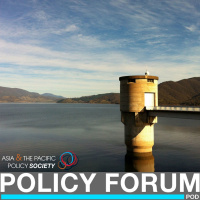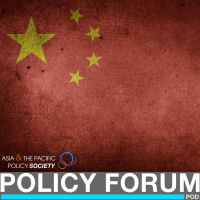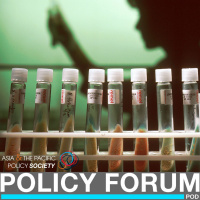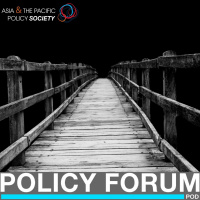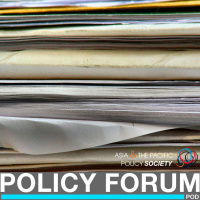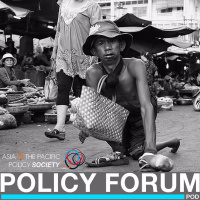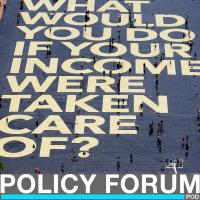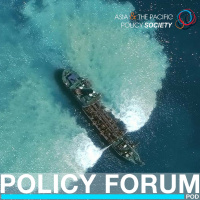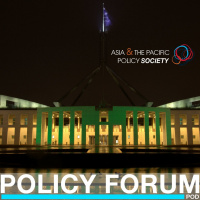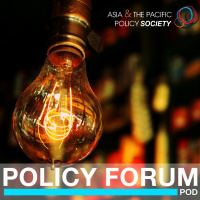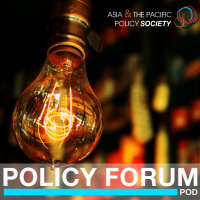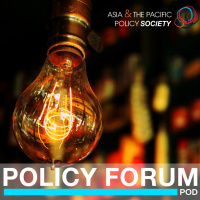Sinopsis
Policy Forum Pod is the podcast of Policy Forum.net - Asia and the Pacific's platform for public policy debate, analysis and discussion. Policy Forum is based at Crawford School of Public Policy at the Australian National University.
Episodios
-
Under the hood of the Asia-Pacific economy
13/04/2017 Duración: 16minIn 1991, more than 90 per cent of Asia’s population lived in low-income countries. By 2015, the wealth of the region had taken a dramatic turn, so much so that more than 95 per cent now live in middle-income countries. What has this change meant for the region, and what will it take to shift gear again and reach high-income status? On this week’s Policy Forum Pod, economists Donghyun Park and Roland Rajah from the Asian Development Bank take us under the hood of Asia and the Pacific’s economic engine, and discuss the latest from the 2017 Asian Development Outlook report. See acast.com/privacy for privacy and opt-out information.
-
All things being equal: Dr Babatunde Osotimehin
30/03/2017 Duración: 32minWorldwide, around 225 million women who want to avoid pregnancy do not have access to safe family planning methods. What does this mean for health and development, and what can policymakers do about it? This question was one of the several topics discussed when Policy Forum’s Martyn Pearce and Crawford School’s Sharon Bessell sat down for a chat with Executive Director of the United Nations Population Fund (UNFPA), Dr Babatunde Osotimehin. On this week’s Policy Forum Pod, we discuss the role of the UNFPA in promoting women’s empowerment, and why there’s still a long way to go when it comes to gender equality. To listen to Dr Osotimehin's speech to Crawford School of Public Policy, as mentioned in the podcast, click here: https://soundcloud.com/anucrawford/tackling-global-health-by-dr-babatunde-osotimehin See acast.com/privacy for privacy and opt-out information.
-
Mental health, migration, and megacities
24/03/2017 Duración: 26minThe United Nations predicts that two-thirds of the world will live in cities by 2050. Policymakers have begun to grapple with the economic and environmental consequences of this wave of urbanisation, but what are the implications for human health and mental wellbeing? On this week's Policy Forum Pod, Professor Nikolas Rose discusses the global move from the countryside to the metropolis, and how the problem of stress might require more creative policy for life in the city. To see the Urban Mind app discussed in the podcast, click here: https://www.urbanmind.info/ For more on Nikolas Rose's work, check out his website here: http://nikolasrose.com/ See acast.com/privacy for privacy and opt-out information.
-
Snowy 2.0: the lowdown on hydro
17/03/2017 Duración: 17minAustralian Prime Minister Malcolm Turnbull has revealed plans for a multibillion dollar extension to the Snowy Hydro-electric scheme, in what he has called a “game-changing” development for Australia’s energy market. But does the proposal hold water? In this week’s Policy Forum Pod Extra, Frank Jotzo, Matthew Stocks, and Ken Baldwin take us through what Snowy Hydro 2.0 might mean for Australian energy policy. For more on energy policy and hydro-power in the Asia-Pacific, see the following Policy Forum articles: How renewables could power Asia https://www.policyforum.net/how-renewables-could-power-asia/ How social can Chinese hydropower dams be? https://www.policyforum.net/how-social-can-chinese-hydropower-dams-be/ Modi powers forward https://www.policyforum.net/modi-powers-forward/ One Dam(ned) mistake after another https://www.policyforum.net/one-damned-mistake-after-another/ You can also see the public stoush between Federal Environment Minister Josh Frydenberg and South Australian Premier Jay Weatherill he
-
Inside the black box of Chinese policy
10/03/2017 Duración: 27minChina is a country of big numbers. Not only does it boast the world’s largest population, but it also has the world’s biggest political party overseeing what is probably the world’s largest bureaucracy. How does this system not only function, but manage on occasion to roll out deep policy reforms at speed? On this Policy Forum Pod, Ryan Manuel takes a look the accomplishments, confusions and contradictions of the Chinese political system, and whether or not other countries could learn a thing or two from China when it comes to policy. See acast.com/privacy for privacy and opt-out information.
-
A marriage of inconvenience: the sharp end where science meets policy
24/02/2017 Duración: 33minThe relationship between science and policy can be difficult at the best of times. Professor Sir John Beddington knows this better than most. In his time as the United Kingdom's Chief Scientific Advisor, he dealt with a number of emergencies, including the swine flu epidemic, the volcanic ash incident that closed Eastern Atlantic air space, and the Fukushima nuclear incident. In this week’s Policy Forum Pod, Professor Beddington discusses the state of science in public policy around the world and what scientists can do to get policymakers listening to the evidence. Professor Sir John Beddington was a guest at the recent Policy Forum, Crawford School of Public Policy, and The Economics and Science Group event ‘Bridging science, economics and policy silos‘. For more from the speakers of that event, see the following podcast and Policy Forum articles: Podcast with Karen Hussey, Kathleen Segerson, and Suzi Kerr: https://www.policyforum.net/bridging-gap-2/ Kathleen Segerson: https://www.policyforum.net/honesty-bes
-
Bridging the gap between science and policy
10/02/2017 Duración: 40minIn an ideal world, public policy would be grounded in evidence and research, drawing upon the best available knowledge from the disciplines of science, humanities and economics. In the real world, however, policy decisions are all too often divorced from evidence-based research. In this week’s Policy Forum Pod, Karen Hussey, Kathleen Segerson and Suzi Kerr discuss the gap that exists between policymakers and academics, and what researchers can do to have a stronger voice and bigger say in policy formulation. All three experts recently took part in a discussion at a Policy Forum event at Crawford School of Public Policy, titled 'Bridging science, economics and policy silos'. They have also all written articles for Policy Forum - links can be found below. Suzi Kerr: https://www.policyforum.net/researchers-mars-policymakers-venus/ Kathleen Segerson: https://www.policyforum.net/honesty-best-policy/ Karen Hussey: https://www.policyforum.net/authors/karen-hussey/ To read more about the 'dialogues' Suzi Kerr discuss
-
Laos: A great place to have a war
03/02/2017 Duración: 28minAmerica’s Secret War in Laos was a proxy conflict fought during the height of the war in Vietnam in the 1960s, and was orchestrated by the US Central Intelligence Agency. While the enormous devastation inflicted upon Laos during the war is now well-known, the details of the CIA’s role has, until now, been a tale left largely untold. In this Policy Forum Pod, Josh Kurlantzick discusses his new book ‘A Great Place to Have a War: America in Laos and the Birth of a Military CIA’, which draws upon extensive interviews and newly declassified CIA records to tell the tale of the Secret War. Josh is a Senior Fellow for Southeast Asia at the Council on Foreign Relations, and was previously a scholar at the Carnegie Endowment for International Peace. He has served as columnist and correspondent for numerous news organisations, including the Economist, the New Republic, and the American Prospect. He is also the winner of the Luce Scholarship for journalism in Asia. This Policy Forum Pod is produced in partnership with Ne
-
Are universities failing society? Asit Biswas and James Giggacher
13/01/2017 Duración: 40minUniversities have long been valued for their role in creating knowledge – knowledge which can hopefully be used for the betterment of society and humankind. But in the age of social media and in what has been called a world of ‘post-truth’ politics, are the best ideas of our scholars and academic institutions cutting through? In the new Policy Forum Pod, experts Asit Biswas and James Giggacher discuss whether universities are now more concerned with chasing global rankings than making a meaningful contribution to society. Professor Asit Biswas is one of the world’s leading authorities on water and environmental management, and currently the Distinguished Visiting Professor at the Lee Kuan Yew School for Public Policy in Singapore. James Giggacher is Editor of New Mandala and an associate lecturer in the ANU Coral Bell School of Asia Pacific Affairs. They are in conversation with Policy Forum Editor, Martyn Pearce Further reading: Kris Hartley's piece on the crucial role of academics in speaking truth to troub
-
GDP RIP?
30/09/2016 Duración: 32minFor decades, Gross Domestic Product (GDP) has been used by just about every country in the world as the most important measure of wealth and progress. In the new Policy Forum Pod, experts Ehsan Masood, Ida Kubiszewski, and Bob Costanza discuss why the world is so obsessed with GDP, whether we should keep using it, and if not – what we might replace it with. Ehsan Masood is a well-known science journalist and editor of the research funding news service, Research Professional. He’s also the author of the new book The Great Invention: the story of GDP and the making and unmaking of the modern world. Dr Ida Kubiszewski is a senior lecturer at The Australian National University’s Crawford School and the managing editor of the magazine, journal and website Solutions and a co-founder and former managing editor of the Encyclopedia of Earth, an electronic reference about the Earth, its natural environments, and their interaction with society. Professor Bob Costanza is a professor and chair in public policy at ANU. Bob
-
Australia's future foreign policy
26/08/2016 Duración: 21minAustralian Foreign Minister Julie Bishop has announced Australia will develop a new Foreign Policy White Paper, its first since 2003. What has changed for Australian foreign affairs over the last 13 years, and what foreign policy decisions should the new White Paper prioritise over the next decade? In the new Policy Forum Pod, Professor Michael Wesley joins Policy Forum Editor Martyn Pearce to discuss the foreign policy environment shaping Australia’s new White Paper. Professor Michael Wesley is Director of the Coral Bell School of Asia Pacific Affairs at The Australian National University. He has published extensively and has authored several books on foreign policy, including The Howard Paradox: Australian Diplomacy in Asia. He won the 2011 John Button Prize for Best Writing in Australian Politics for his book, There Goes the Neighbourhood: Australia and the Rise of Asia. If you’d like to learn more about some of the issues raised in this podcast, head along to the Australia 360 Conference held by the ANU C
-
#Censusfail - what went wrong, why, and what to do about it
12/08/2016 Duración: 39minThree experts discuss the concerns around the Australian Census, how the data is used by researchers, and why the census website went offline on its big night. At 7.30pm, on the night of 9 August, as the government was urging people to login and complete the census online, the website specifically designed to collect data directly from Australia’s 24 million strong population, was taken offline following a series of what is being called denial of service incidents. These incidents, caused by parties as yet unknown, involved the routing of huge volumes of data through servers in the US to essentially crash the website. The incident has become a source of embarrassment for the agency responsible for delivering the census, the Australian Bureau of Statistics, and by extension the Australian Government. It has generated widespread concern, not to mention inconvenience, for pretty much the entire Australian population, and raises serious questions about trust, privacy and the cyber security of government agencies.
-
Cambodia: apocalypse then, apocalypse now - Gareth Evans and Simon Springer
29/07/2016 Duración: 30minIn a new Policy Forum Pod two leading experts shed some light on the disturbing human rights violations being committed on Phnom Penh’s homeless people in contemporary Cambodia. Cambodia is a country whose recent past was plagued by extreme violence: large-scale bombing, civil war, invasion and genocide, acts that in total killed more than two million people over two decades. But it’s also a country whose present appears to be plunging back into the human misery of its haunted past, with not only state-sanctioned, but state-perpetrated violence being carried out against some of its most vulnerable citizens. It’s violence that is being largely overlooked by the international community. It is a situation in which Phnom Penh’s homeless people are systematically being rounded up by police, their possessions arbitrarily destroyed, and they themselves are being deported to what are effectively concentration camps outside the capital where they are subjected to appalling conditions. This is part of a broader pattern
-
A basic income, or the end of the welfare state?
15/07/2016 Duración: 53minWhat would you do if your income were taken care of? In this Policy Forum Pod, four leading experts discuss the idea of a basic income - how it works, what it could do, and what it could mean for the future of the welfare state. In conversation with Policy Forum Editor Martyn Pearce are Professor Guy Standing, Dr Charles Murray, Professor Peter Whiteford, and Professor Olli Kangas. Guy Standing is an economist at the School of Oriental and African Studies at the University of London. He is the author of a number of well-known books including 'The Precariat: The New Dangerous Class'. He is also co-founder and current President of the Basic Income Earth Network - an organisation with thousands of members around the world (http://www.basicincome.org/). Charles Murray is the WH Brady Scholar at the American Enterprise Institute in Washington DC. Dr Murray is one of the world's leading social policy researchers and the author of a number of best-selling books, including The Bell Curve, which controversially looked
-
Judgement day in the South China Sea: Policy Forum Pod extra
13/07/2016 Duración: 33minThe Permanent Court of Arbitration has ruled in favour of the Philippines in its dispute with China over the South China Sea. It's a historic ruling and one that will be a game-changer in one of the region's flashpoints. In this Policy Forum Pod extra, two experts discuss the ruling, what it means for China and the region, and what comes next for the Philippines. In conversation with Policy Forum Editor Martyn Pearce are: - Professor Don Rothwell, an international law expert from the Australian National University College of Law - Dr John Blaxland, a Senior Fellow at the Strategic and Defence Studies Centre at the ANU Bell School of Asia Pacific Affairs. See acast.com/privacy for privacy and opt-out information.
-
Australia votes, then waits: Policy Forum Pod
04/07/2016 Duración: 42minIn a special Australian Policy Pod, experts from Crawford School of Public Policy discuss the outcome of the Australian Federal Election on Saturday 2 July. The panelists look at the policy highs and lows of the long campaign, which policies resonated with voters, and what the next few years holds in store for whoever eventually makes up the next government. The panellists are: Professor Quentin Grafton - professor of economics at Crawford School of Public Policy and Editor-in-Chief of www.policyforum.net Sue Regan - A policy analyst at Crawford School and a former political advisor to the UK Blair government Bob Cotton - Visiting fellow at Crawford School and a former diplomat. The podcast is presented by Martyn Pearce, Editor of Policy Forum. Photo by Lauri Väin on Flickr: http://bit.ly/29aCrNr See acast.com/privacy for privacy and opt-out information.
-
Are regional policies failing women?
01/07/2016 Duración: 30minIs the Asia-Pacific region doing enough to tackle gender inequality? And how can public policy help to address women's rights and ensure greater opportunities in the workforce? In this Policy Forum Pod, Kelly Hayward talks to two experts about the challenges facing women in Asia, and the obstacles preventing gender equality throughout the region. Helping to unpack these issues are: * Associate Professor Susan Harris-Rimmer, Griffith Law School, Brisbane, Australia; * Professor Jacqui True, Monash University, Australia. See acast.com/privacy for privacy and opt-out information.
-
Should I Stay Or Should I Go? Asia-Pacific Views On Brexit
21/06/2016 Duración: 42minOn 23 June Britain heads to the polls in a referendum that will decide whether or not the country stays in the EU - the so-called 'Brexit' vote. In this Policy Forum Pod, three experts give a distinctly Asia-Pacific take on the issues, looking at how it came about, what the consequences might be whichever way the vote goes, and what it will mean for the Asia-Pacific region. The interviewees are: Professor Jürgen Bröhmer - Professor of Law and Dean of the Law School at Murdoch University, Western Australia Professor Clem Macintyre - Professor in the Department of Politics and International Studies at the University of Adelaide. Professor Lawrence Pratchett - Dean of the Faculty of Government and Law at the University of Canberra. This episode is produced and presented by Policy Forum.net Editor, Martyn Pearce. See acast.com/privacy for privacy and opt-out information.
-
Post-Paris: Turning the climate agreement into action | Ottmar Edenhofer and Frank Jotzo
17/06/2016 Duración: 12minThe Paris climate agreement was a landmark agreement bringing together 175 countries. But can governments around the world turn a diplomatic victory into an economic and environmental win? And what's the future of the agreement under a new US President? In conversation with Fiona Benson are two leading experts on the Paris agreement, Professor Ottmar Edenhofer and Associate Professor Frank Jotzo. Ottmar Edenhofer is Deputy Director and Chief Economist at the Potsdam Institute for Climate Impact Research (PIK) and Professor of the Economics of Climate Change of the Technical University Berlin. He is also Director of the Mercator Research Institute on Global Commons and Climate Change (MCC) as well as adviser to the World Bank regarding issues of economic growth and climate protection. From 2008 to 2015 he served as Co-Chair of WGIII of the Intergovernmental Panel on Climate Change (IPCC). Frank Jotzo is Associate Professor at and Deputy Director of ANU Crawford School of Public Policy, Director of the Centre f
-
The Vote: Australian election series - health policy event
16/06/2016 Duración: 59minHealth policy is at the core of the 2016 Federal Election, regularly ranked as the issue most important to voters. In this event, ANU health policy experts discuss where the parties stand and what's missing from the debate. The panel for this week was Professor Sharon Friel, Director, RegNet, ANU, Professor Art Sedrakyan, Department of Health Services Research and Policy, Research School of Population Health, ANU and Professor Adrian Kay, Director of National Professional Development, Crawford School of Public Policy, ANU. The event was moderated by Cath McGrath, Chief Political Correspondent for SBS TV. The Vote: 2016 Federal Election Series presented in partnership with the ANU Policy Forum is an opportunity to engage with ANU public policy experts during the 2016 Federal Election. Join the ANU community at a weekly panel in the Molonglo Theatre at the ANU Crawford School of Public Policy as experts discuss a different public policy issue every week until the election. See acast.com/priva
